To celebrate National Mentoring Month, we are featuring a series of guest posts reflecting on mentorship. This week’s feature from Jeremy Boldt, Manager, Learning and Organization Development with the Argonne Leadership Institute, is about how mentoring supports learning and development goals.
In 2022, LinkedIn Learning published their report on the state of workplace learning. According to the report, “Opportunities to learn and develop new skills” was among the top five factors in employee career decisions. But what does this mean from a practical perspective? Learning and developing new skills are laudable goals, but in a sometimes frantic, change-heavy world, how can we as employees make this happen?
During my nearly 20 years in the world of learning and development, I’ve heard some variation of the phrase, “We need more training” more times than I can count. The problem with this approach is evident – more training means more time away from work, more resources, more money. And there’s no guarantee that sitting down for an online training course or traveling to an in-class workshop will help you improve your skills. Mentoring can be an excellent way to create meaningful, lasting, and timely learning opportunities that go far beyond those of traditional trainings. And it fits right in to the 70/20/10 approach to learning.
If you’re unfamiliar, the 70/20/10 model is a way to help visualize what learning can be when you think beyond traditional approaches to training (e.g., workshops, eLearning courses, etc.) According to this approach, 70% of what we learn comes from doing. Feedback from Argonne employees supports this; in our 2023 learning needs survey, 74.8% of the 522 respondents identified on-the-job experiences in their top 3 for learning opportunities. But in addition to learning by doing, it’s important for us to think about who can help us along that journey. That’s where engaging the right mentor fits in.
It’s easy to think of mentoring as limited to the 20% (relationships) of the 70/20/10 model. Truly impactful mentorship, however, can benefit your on-the-job experiences as well. When you cultivate a solid relationship with your mentor, you’ll often find a ready-made sounding board who can help guide you through your day-to-day work. Have you encountered a particular challenge? Talk to your mentor and ask them if they have ever experienced something similar. What did they do? What worked well? What didn’t work well? Have you recently taken a training course or program? Talk to your mentor about what you learned and how you think you might be able to use it. Having conversations like these not only broaden your perspectives and provide insight into the experiences of others, but it can provide you with actionable suggestions on how you can overcome barriers, address challenges, and lead yourself (and others) on a solid path forward.
Like so many things in life, you’ll get out of a mentoring relationship what you put into it. Whether you are a mentor or a mentee (and many times, they can be one and the same), remember this: mentorship is a great way to build a bridge between what we can learn in more formal settings and what we can do.


